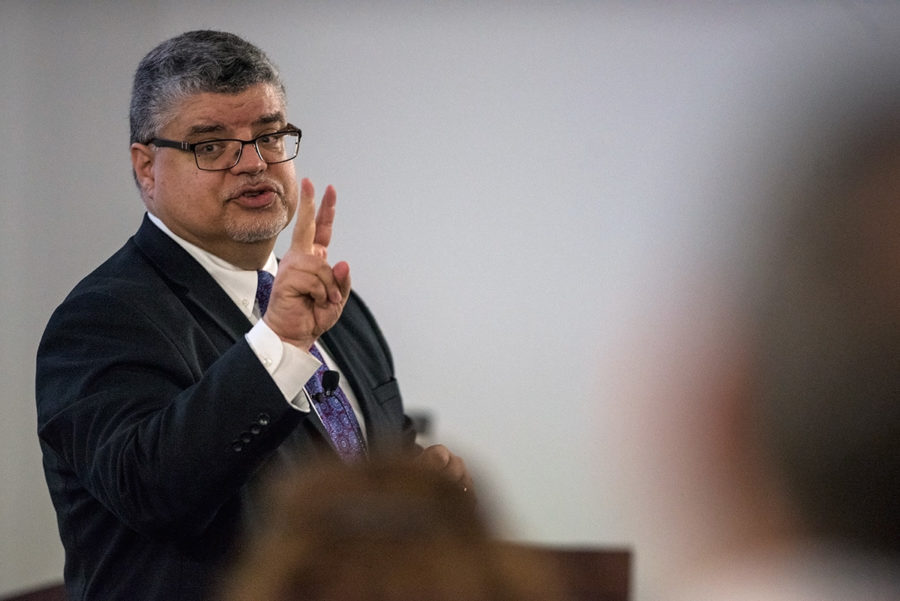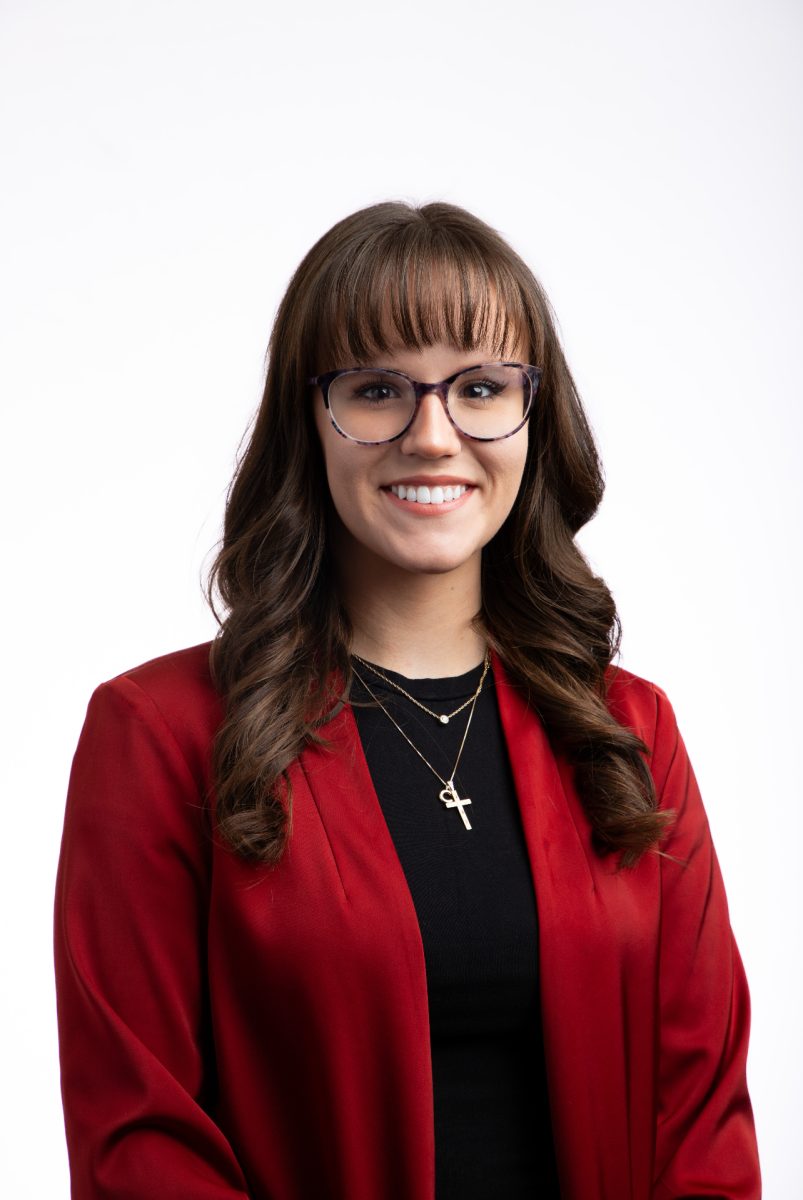Colwell makes case for chancellor spot
Interim Chancellor Brad Colwell speaks at a forum on the morning of Tuesday, April 25, 2017, in Guyon Auditorium. During the forum, Colwell spoke about numerous issues including, but not limited to, enrollment, campus diversity and the impact of the state’s budget impasse on the university. (Jacob Wiegand | @jawiegandphoto)
April 25, 2017
Interim Chancellor Brad Colwell wants to bring stability to the leadership at SIU.
Colwell, who began his two-year term Oct. 1, 2015, said without a permanent contract there were many things he was not able to do as chancellor. Now he’s vying against two other candidates to get rid of the ‘interim’ in his title.
“I was brought in to steady the waters, and I think we have,” Colwell said, referring to SIU’s history of administrative turnover. In the past 20 years, the university system’s largest campus has had 11 different leaders.
Advertisement
“It would almost be laughable if it wasn’t so serious,” Colwell said. “We need direction.”
During a forum Tuesday morning, the interim chancellor outlined future strategies he’ll implement if selected to continue the role. He said key issues for the campus in the next five or 10 years will be recruitment and retention.
SIU’s enrollment hit its lowest point since 1965 in the fall 2016 semester, and in spring 2017 the student population saw a decrease of 7.4 percent compared with 2016.
In late March, SIU President Randy Dunn announced his plan to cut at least $30 million in spending from the university’s $450 million budget. At least $2 million of those cuts, Colwell said, were made with the expectation that enrollment will continue its downward slope for the fall 2017 semester.
Colwell said the admissions office is fully staffed and targeting, “with renewed vigor,” Illinois, Missouri, Arkansas, Indiana and Kentucky, among other states.
Recruiters visited every high school in Illinois last year, which Colwell said might not continue in the coming years but was necessary to re-establish connections, especially with smaller schools.
The university will have to increase efforts to reach out to community colleges as well, Colwell said.
Advertisement*
“They’re not churning out students here like they need to be,” he said. “We’ve tried different things with various levels of success, but we can’t give up.”
Still, Colwell said, it isn’t just up to him or the admissions office. He said the campus community as a whole needs to fight “misperceptions” about SIU.
“These negative conversations are out there by the bucketfuls,” Colwell said. “One is that this campus isn’t safe, but this is a good community and we have a beautiful, safe campus.”
Asked how he would lead the university through the unprecedented state budget impasse, Colwell said the key is figuring out how to run the campus better for when state funding does return.
In January, a committee formed by Colwell released a report prioritizing non-academic units on campus and identifying long-term cash-saving measures. These included an automated employee hiring service called HireTouch, switching to direct deposit to pay vendors and eliminating state funding to centers that “should be self-supporting” such as SIU’s Counseling and Psychological Services and Office of Economic and Regional Development.
Colwell said about one-third of the committee’s proposed measures are in place and the rest are still in the process of being implemented.
The interim chancellor also addressed the possibility of layoffs in the future, saying the largest amount of money could be saved through salaries.
“The morale is about right here,” Colwell said, gesturing to the floor. “People are nervous, asking, ‘Am I going to have a job?’’’
Colwell said the administration is making conscious efforts to protect jobs and avoid furloughs with the “prayer” that the state Legislature will pass a budget soon.
Tomas Velasco, representing the Graduate Council, asked how the university would realistically look five or 10 years from now.
Colwell said the the student body will likely look different.
“It’s not going to be the traditional 18-year-old that our future will be built on,” Colwell said. “We need to prepare for that.”
SIU could have more non-traditional students, which Colwell said included veterans, single parents and those with special needs.
Colwell said he foresees fewer students on campus, with a higher focus on online and commuter students.
“This summer will be the first where we clearly bypass the number of online summer students as opposed to on-campus,” Colwell said. “It works for me; I want these students and I don’t care if they’re in Rockford at a community college as long as they’re taking classes here, too.”
The campus itself will also look different, Colwell said, with Schneider Hall being left vacant in the fall to prepare for its demolition. This is the first step in the university’s $257 million dollar plan to tear down Neely, Mae Smith and Schneider halls, collectively referred to as “the towers,” and replace them with new dorms over the next decade.
Colwell said he thinks SIU’s enrollment “sweet spot” is around 18,000 students, and the campus will never return to the days when it enrolled 25,000.
This is because the university used to offer associate degrees, Colwell said, but those degrees went into the community colleges in the ‘90s.
“Maybe we didn’t make an adjustment like we should have, but people think we failed because we lost those students,” Colwell said. “Folks, we didn’t lose them; they were taken away from us.”
Asked about his plans for diversity and inclusivity on campus, Colwell said it is crucial to make minority and marginalized students feel safe and welcome.
“We learn as much from them as they will from us, and I feel that about every single group that falls within the ‘diverse’ title,” Colwell said. “Iron sharpens iron, folks; it’s what makes this campus vibrant.”
A year ago Tuesday, Colwell held a press conference to announce that university administrators worked with YouTube to take down a racist video calling for lynchings on campus. The chancellor’s announcement came about a week before the May 2 campus-wide protest against racism, student loan debt and other issues.
Student-led organizations — including the Graduate and Professional Student Council and the Black Affairs Council — later called on the administration to do more to combat racism on campus.
“When faced with the threat of lynching, email assurances and ‘listening sessions’ are not enough,” the Black Affairs Council wrote in a statement.
In the fall 2016 semester, the university formed a Diversity Council to address these issues on Carbondale’s campus.
Colwell said the goal is for students to feel that the council represents them and that the administration hears their concerns.
“I don’t care if they’re tall, skinny, their religion, sex, whatever — we want to support all our students,” Colwell said.
Faculty Senate President Judy Davie asked how Colwell perceives the role of employee constituency groups in policy development and decision-making.
Colwell said it’s important to communicate with constituency heads for the institution to be effective.
“We’re in tough times right now and you all deserve the right answers,” Colwell said. “I surround myself with good people and trust them to do their jobs, and I ask that you please do not hesitate to ask the tough questions.”
Colwell began his career in higher education in 1996 as an assistant professor in SIU’s department of education administration and higher education, with an office across the hall from Dunn. From there, Colwell and Dunn collaborated on published works and public lectures concerning issues in university administration, education and law.
Before Colwell’s interim appointment, Dunn filled in as chancellor along with his regular duties as the university president for nearly a year following the November 2014 death of interim Chancellor Paul Sarvela.
Colwell did not apply during the national search for the position he holds. Rather, Dunn reached out to him personally within two weeks of announcing Colwell’s appointment. SIU’s president has said the campus was divided on the leading candidates, forcing him to find an alternative finalist.
George Hynd, president of Oakland University in Rochester, Michigan and Carl Pinkert, vice president for research and economic development at the University of Alabama, are also vying for the spot. Hynd is the only candidate who has not attended or previously worked for SIU, with a bachelor’s and a master’s degree in psychology from Pepperdine University in California and a doctoral degree in education from the University of Northern Colorado. Pinkert earned his master’s degree in animal science from SIU in 1977.
Jeff Elwell, dean of the College of Arts and Sciences at the University of Tennessee at Chattanooga, dropped out of the running last week after being offered the president position at Eastern New Mexico University.
The search for a permanent chancellor comes during a financially difficult time for the state and university.
During his nearly 19 months as chancellor, Colwell has led the campus during one of the most financially strained times in its history. For almost two years, Republican Gov. Bruce Rauner and Democrats who control the state Legislature, including House Speaker Michael Madigan, have not been able to pass a state spending plan.
Colwell said there isn’t a “magic bullet” to fix the university’s financial woes, and it’s important to keep planning for the future.
“If ever there is an institution that closes, it won’t be us,” Colwell said. “We won’t be the first; there are many other institutions that are truly, truly beyond the lifeline. Let’s keep looking forward.”
Staff writer Luke Nozicka and campus editor Bill Lukitsch contributed reporting.
Staff writer Marnie Leonard can be reached at mleonard@dailyegyptian.com or on Twitter @marsuzleo.
To stay up to date with all your southern Illinois news, follow the Daily Egyptian on Facebook and Twitter.
Advertisement









